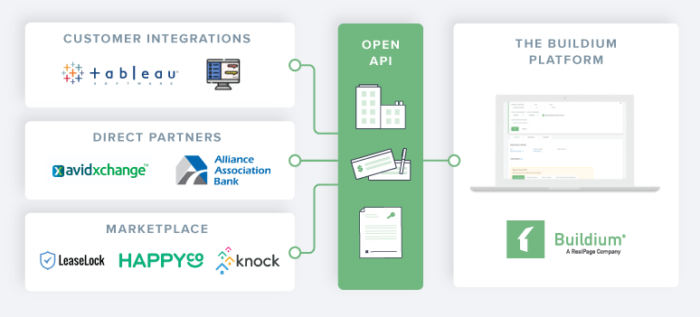Take a second and think about how much information you collect from your residents, owners, and properties each day. From your books to your residents’ technology adoption, there’s a well of hidden value buried underneath the surface. Many property management companies already know that they’re sitting on all this data that can help them make their operations more efficient and inform sound decision-making—and that’s precisely the reason why an open API is so timely.
Chart of Accounts
Want clearer, cleaner books? What about a more useful view into your properties or just easier accounting in general?
Get the GuideSo why has Buildium released an open API? It all comes down to the property management industry’s appetite for access to data and how property managers can benefit from it.
Patrick Rubeski, VP of Engineering at Buildium says, “Here, what you’re seeing is more of a pivot in the industry around access to data and ease—and enablement—of using that data to help make good business decisions. Now you actually have the ability to access your data through myriad tools—and even to build your own tools.
And that becomes really important because in the industry we’re seeing an enormous amount of activity. There are really great products up and down the stack. What this gives you the ability to do is integrate with those products with ease and also do it in a really custom way if you want.”
In the following post, you’ll not only get a primer on what an open API is, and how you can contemplate using it, but also hear directly from those who envisioned and built Buildium’s new, open API.
Want to see detailed use cases from Buildium customers? Check out our guide: 8 Property Management Business Goals Buildium’s Open API Can Achieve.
What’s an API?
An Application Programming Interface (API) is a set of rules and definitions that allow different pieces of technology to communicate with each other. A well-built, secure, and well-documented API is a foundation for software development. An open API essentially gives any developer the possibility to create software to plug into an external platform (in our case the Buildium application) to either write or extract certain data.
Think of an Open API as a courier. There are items you can order from a catalog and the courier will deliver them to your home from the warehouse. This is called “reading” data. The difference with an open API though is that you can send your requests back to the warehouse through the courier to “write” data as well.

Generally, the integrations that take place fall into 3 categories: customer integrations, direct partner integrations, and a marketplace—where entrepreneurial developers can sell their own inventions (more on this later). These aren’t new forays in the tech world by any means, but a true open API and marketplace wasn’t common in the property management industry, until RealPage introduced RPX to push our industry to think differently.
How does an open API work in property management software?
At its core, an API helps connect two different systems and serves as the point of contact that does the communicating and heavy lifting. As mentioned above, an API lays out the specific rules (or protocols) that need to be followed to gather or send the requested information. It’s not exactly like getting the keys to the castle because you always have to rely upon an intermediary that has its own set of very specific rules.
To understand the inner workings of an API, it’s necessary to define the key components that help it work properly.
API Endpoints: The digital doorway between two systems—it’s the place where both systems interact. An endpoint is the way the API can access the data that’s being requested. What those are depends on the rules of the API.
API Key: The authentication code or password that each API integration needs to connect and also identify the system making the request. Every time happens a record of it is kept so that the system can keep tabs on everything, which is especially useful as APIs get more popular. Usually, each API key is associated with specific access permissions.
API Request: This is the whole reason you set up an API integration—to make requests to send or receive data. An API request happens when a developer adds an endpoint to a URL and makes a call for that data.
Now that you have an understanding of the key terms in an API, let’s get into how you can use it.
What can property management companies do with an open API?
Like most things, you want to know how any piece of technology is going to drive value for your business and customers. Just because a new, shiny technology exists, doesn’t mean it’ll be worth doing.
As many are already aware, property management platforms exist as a central hub for property management operations. And since it’s an efficiency-driven industry, where scale can drastically affect profitability, the more property managers can do inside of a single platform, the more profitable they’ll be.
Reporting & Workflows
Now let’s just use the Buildium API as an example to understand what property managers can actually do with it. From leasing metrics to resident technology adoption, the Buildium API opens up over 20 powerful endpoints that let you easily retrieve core data sets in real-time, through standard HTTP requests. According to Howie Mulcahy, Software Development Manager, “we see two main things that are popping out now as we get more feedback: reporting and workflows.”
Regarding reporting, a community association property management company might need a custom report for their board—and so getting that data and feeding it into another dashboard might make sense.
When it comes to workflows we are talking about integrations that assist in the property management operations and tasks. A property management company might need to pull some data into a Google sheet for example to help with the turn over. No matter which of the two categories, it’s critical to calculate how much time will be saved. If you break down an individual task, how much faster did you just make that single task for your team?
Open API or not, the fact is that many property management companies may not want to develop and maintain software that relies on an integration—and that’s completely legitimate. This is where the marketplace concept picks up speed.
For a technical guide on everything Buildium API, visit developer.buildium.com.
The Marketplace Concept
When you think about a marketplace, you’ll usually imagine market leaders like Salesforce’s AppExchange and Atlassian’s Marketplace, who have successfully created a culture and business model that attract entrepreneurial developers to create new pieces of software. For many small businesses, the absence of development is an incredibly attractive prospect, since they won’t have to pay for their own development team.
Additionally, a powerful concept that sits behind any marketplace is the idea of the democratization of that technology. A marketplace can level the playing field and lead to new startups that find their niche if they do it well.
An open API brings so many more possibilities to the table—many of which are hard to envision at the start. One thing’s for certain, if an open API makes the property management tech stack simpler for most property managers, then it will be successful.
And to sum it all up Rubeski points out,“You now have access to that data to use as you want throughout your ecosystem—throughout your technology stack. And that’s a really empowering thing.”
Read more on Buildium News
